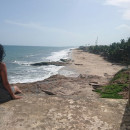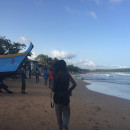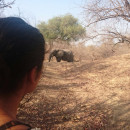The Gold Coast stole my heart Past Review
By Giselle Lemus (University of New Haven) - abroad from 01/15/2017 to 05/27/2017 with
University of Cape Coast: Cape Coast - Direct Enrollment & Exchange
I definitely became more independent and learned more about not only Ghanaian culture but also the cultures of the other international students I befriended. I learned about how strong and beautiful the African diaspora and its people are, and I was extremely excited to learn about the diaspora's history and resilience. Africa is a massively misunderstood continent - I had traveled to Malawi in high school and have always been bothered by the stereotypes and bad reputation the Western world has plagued the continent with. I don't regret my trip abroad and would most definitely do it again, and encourage others to see what the continent and the country of Ghana have to offer.
Review Photos




Personal Information
| How much international exposure did you have prior to this program? | 1 month - 6 months |
Review Your Program
|
* Overall educational experience
Academic rigor, intensity, resources, etc. |
One of the main reasons I was interested in the University of Cape Coast was because it has such a great variety of classes. I took the following courses: Pan-Africanism and Nationalism in Africa Regionalism and Integration in Africa African Economies and Development Women in Cross-Cultural Perspectives Modern Latin America from 1825 I can't express how excited I was to finally be able to learn about the continent because it's so difficult to find classes on multicultural studies at my university. I am so thankful I took these courses because I learned so much about Ghana and the continent of Africa - information I don't believe I would've learned in a class at my home institution. I was able to experience a different style of teaching and gain new perspectives from both my professors and my fellow classmates. UCC's students are known for being very studious (which is why it's one of the best universities in West Africa) and I greatly admired how dedicated they were to their studies. However, for all my classes I was only graded for 3 exams, so the first two exams were 25% each and the final exam was 50%, it may seem daunting but just make sure you pay attention in classes and TAKE NOTES, you can't dose off in class. If you struggle, your fellow classmates are always eager to lend a helping hand so you understand, and the professors have office hours if you have any questions or concerns, they understand that international students may need more time to adjust to the education system. However, my only major issue was the lack of communication from the school with its students, I wasn't made aware when my final exam dates and location would change so I actually missed an exam (thankfully, I was able to make it up) but make sure to be on top of that and to check the student portal consistently. Also, for the beginning weeks I had trouble finding some of my classes because the professors communicate with the class through a class representative, so if there was a change in the class time or location and you didn't know the representative - you had to spend some time to find out what was going on. But PLEASE don't let this deter you, it's a new school in a new country so you may come across some hiccups so don't be afraid to ask for help! Also, if you are able to take a course with Professor De Valera Botchway, TAKE IT - he's a fascinating human being who breaks away from the traditional style of teaching and makes you think outside the box, I wish I had more professors like him. |
|
* Host Country Program Administration
On-site administration of your program |
The study abroad office at UCC were extremely friendly, and fun to joke around with. However, my friend and I had to continuously hound the institution to send our grades/transcript to our home institutions, so don't feel shy to reach out if there's a time-sensitive task you need done. |
|
* Housing:
How satisfied were you with your living arrangements? |
I was extremely pleased with the living arrangements, you share the room with one other person and you share a kitchen and bathroom with two other people. The school provided us with water, bug spray, sheets, pans, kitchen utensils and gas for the first few weeks (then you have to buy your own) and I was thankful for that. Of course, be prepared for blackouts so make sure to charge your electronics just to be safe! It was also convenient to have a store that sold household items and some food right down the hallway! I also loved that we were close to our classes, other residence halls, and plenty of restaurants! My friends and I would often eat at the Sasakawa Clubhouse. There is security and you live on the same floor with other international students, and the rest of the building houses local students as well, so you get the best of both worlds. |
| * Food: |
Food! Please make sure to try everything! International students are housed near restaurants and the local market so make sure to hit them up! There's also GREAT restaurants in town, like the Castle restaurant, Kokodo guesthouse, and alot of yummy vegetarian restaurants (PLEASE VISIT EMPEROR ITAL'S RESTAURANT near Cape Coast Castle - it's the absolute best, everything is made fresh and the people that work there are the kindest people you'll ever meet.) The only thing I really missed was dairy (especially cheese) and my mother's food. |
|
* Social & Cultural Integration:
How integrated did you feel with the local culture? |
Ghanians are the absolute best, they are the reason why my trip was so beautiful. It's so easy to befriend the people and they're just as eager to learn about you, as you are about them. My friend and I befriended so many beautiful people who were eager to show us around the country, to teach us about the history of the country, to introduce us to the local cuisine, arts and crafts, and they made us feel at home. It truly broke my heart to leave Ghana because the people are so chill and so loving. |
|
* Health Care:
How well were health issues addressed during the program? |
So, because I didn't protect myself enough I did end up getting Malaria. But because I caught the symptoms on time and visited the hospital that's on campus, I was better by the following week. If you have a health concern, depending on how serious it is, you can either hit up the local pharmacy and they can give you something or you can go to the hospital. You're obviously going to spend some time in the hospital because it's open to the public and to students as well. I guess my only issue (which really isn't an issue but it bothered me anyways) was that they always pushed the international students ahead of line regardless if you were first to be waiting or not. I just felt bad for the families and individuals who were waiting before me. |
| * Safety: |
Never did I question my safety in Ghana, even when my friend and I walked through some alleys trying to find food late at night (don't do that anywhere but we were really hungry after a long trip). Of course there's dangers no matter where you go, so just use your common sense when traveling :). |
| If you could do it all over again would you choose the same program? |
Yes
It was one of the hardest things to leave Ghana because of the friendships and experiences I made, I'm extremely thankful I got to live 5 months in another country, Ghana is truly one of a kind. |
Finances
|
* Money: How easily were you able to live on a student's budget?
(1 = not very easy/$200+ on food & personal expenses/week, 2.5 = $100/week, 5 = very easily/minimal cost) |
The US dollar is worth 4x more in Ghana, which is upsetting for the Ghanian economy but it's cheaper to study and travel in Ghana than let's say somewhere in Europe. If you did some light traveling, you could definitely live off of $400 for an entire month (you might even have some money left over.) The Ghanaian currency is the "cedi." |
| Not including program expenses, about how much money did you spend on food and other expenses each week? | $10 |
| Do you have any general money-saving tips for future study abroad participants? | Just be safe with your money and always have some backup money in case of an emergency! It's always exciting to see all the stuff you can buy, but make sure to buy it if you know you'll be upset to leave it behind. Oh, and DO NOT be afraid to bargain but don't try and con the vendors, they're making their livings. During your orientations, they elaborate more on bargaining and what to do and not to do with your money. |
Language
| * Did your program have a foreign language component? | No |
Other Program Information
|
* Where did you live?
Select all that apply |
|
|
* Who did you live with?
Select all that apply |
|
|
* Who did you take classes with?
Select all that apply |
|
| About how many local friends did you make that you will likely keep in touch with? |
A Look Back
| * What did you like most about the program? |
|
| * What could be improved? |
|
| * What do you know now that you wish you knew before going on this program? | I wish I had packed more essentials, like bug spray, clothes, shampoo and all that. |
Reasons For Studying Abroad
| To help future students find programs attended by like-minded individuals, please choose the profile that most closely represents you. |
The Avid AdventurerThe wardrobe you packed was better suited for a semester of camping than club hopping. Outdoorsy, you might forgo a crazy night out for an early all-day adventure. You'd rather take in the rich culture of an old town than the metropolis of a modern city, but for you getting off the grid is ideal. |








